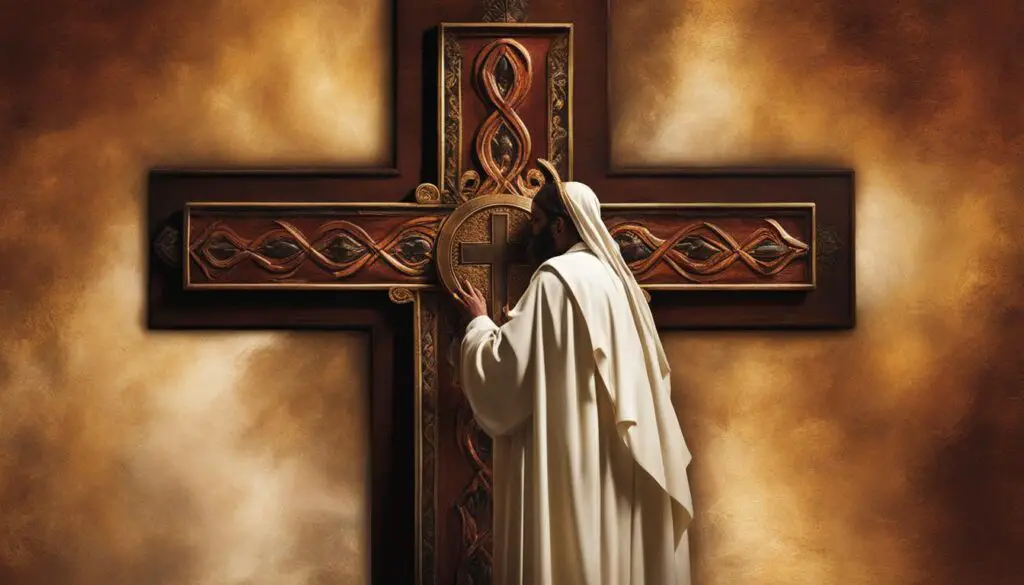The traditional prayer of absolution is a sacred and integral part of the sacrament of reconciliation in the Catholic Church. It offers comfort and solace to those seeking forgiveness and reconciliation with God. Through this ancient and beautiful tradition, individuals can find healing and renewal, receiving the divine mercy that brings inner peace.
After confessing their sins, the penitent receives guidance and advice from the priest, followed by an act of making amends, typically through prayers. The priest then offers the formal prayer of absolution, which ritually forgives the sins of the penitent. This moment is a powerful experience of God’s grace, leaving the person free from guilt and ready to embrace a renewed relationship with God.
Key Takeaways:
- The traditional prayer of absolution is an essential part of the sacrament of reconciliation in the Catholic Church.
- It offers forgiveness and reconciliation with God through a sacred ritual.
- After confessing sins, the penitent receives guidance from the priest and performs prayers or acts of making amends.
- The priest administers the formal prayer of absolution, ritually forgiving the sins of the individual.
- Seeking forgiveness through the traditional prayer of absolution brings solace, healing, and inner peace.
The Words of Absolution in the Catholic Tradition
In the Catholic tradition, the prayer of absolution holds a special significance as a key component of the sacrament of reconciliation. This prayer, uttered by the priest, conveys the forgiveness of sins in a ritualistic manner, offering solace and peace to those seeking forgiveness.
The prayer of absolution begins by acknowledging God as the Father of mercies and emphasizes the reconciliation of the world through the death and resurrection of Jesus Christ, the ultimate act of forgiveness. It is a powerful reminder of God’s infinite mercy and love for humanity.
“I absolve you from your sins, in the name of the Father, and of the Son, and of the Holy Spirit.”
These words, spoken by the priest, hold immense spiritual significance. They conclude the prayer of absolution, symbolizing the priest’s authority to absolve the penitent from their sins, reaffirming the penitent’s restored relationship with God and the Church.
This traditional prayer of absolution serves as a source of comfort and hope for those seeking forgiveness, reminding them of God’s unfailing love and the power of reconciliation. It is a sacred moment that affirms the penitent’s journey towards spiritual healing and renewal.
Example: Prayer of Absolution
“Almighty God, the Father of mercies, through the death and resurrection of his Son has reconciled the world to Himself and sent the Holy Spirit among us for the forgiveness of sins. Through the ministry of the Church, may God give you pardon and peace. And I absolve you from your sins, in the name of the Father, and of the Son, and of the Holy Spirit.”

Changes to the English Formula for Absolution
In the sacrament of penance, the English formula for absolution is about to undergo some changes in the upcoming year 2023. The U.S. Bishops have voted on slight translation alterations in the current formula, and these changes have been approved by the Vatican. The purpose of these revisions is to enhance the understanding and experience of absolution for both confessors and penitents.
| Current Formula | Revised Formula |
|---|---|
| Sent | Poured out |
| Give | Grant |

This translation adjustment aims to provide a deeper level of connection and resonance by employing more evocative language. Replacing “sent” with “poured out” emphasizes the generous outpouring of divine mercy and forgiveness upon the penitent. Similarly, substituting “give” with “grant” underscores the granting of absolution as a gift freely given.
By introducing these changes to the English formula for absolution, the sacrament of penance seeks to create a more profound and meaningful experience for those seeking forgiveness and spiritual healing.
Absolution as a Sacrament in Christian Denominations
Absolution holds a significant place as a sacrament in various Christian denominations. This sacred act of forgiveness and reconciliation is practiced in the Catholic Church, Eastern Orthodox Church, Oriental Orthodox Churches, and the Lutheran Church.
The sacrament of reconciliation prayer, also known as the Catholic absolution prayer, is a means of receiving forgiveness from ordained priests. It emphasizes the power of God’s forgiveness, which is bestowed through the ministry of the Church. Absolution serves as a profound act of reconciliation and spiritual renewal for believers.
In the Catholic Church, absolution is an essential part of the sacrament of penance, allowing individuals to confess their sins and seek God’s mercy. Through the Catholic absolution prayer, the priest acts as a mediator, offering forgiveness on behalf of God.
Other Christian denominations follow similar practices, understanding absolution as a sacramental act that brings believers closer to God and provides spiritual healing. The sacrament of absolution is a powerful reminder of God’s love and mercy, inspiring believers to seek forgiveness and grow in their faith.

From the Catholic absolution prayer to the prayers of absolution in other Christian traditions, this sacrament serves as a profound opportunity for believers to find solace, receive forgiveness, and experience spiritual restoration.
Different Perspectives on Absolution in Christian Denominations
Absolution, the act of seeking forgiveness and reconciliation, holds different meaning and significance in various Christian denominations. While it is viewed as a sacrament in certain traditions, others consider it an essential aspect of church life without classifying it as a sacrament. The Catholic Church recognizes absolution as a sacrament, accompanied by a penitential prayer, known as the Catholic absolution prayer.
The Anglican Communion and Methodism, among other denominations, include absolution as a practice commonly referred to as a sacrament, even though it may not be officially classified as such. Within different Christian traditions, the practice and theology of absolution vary, reflecting the diverse perspectives on this act of forgiveness.
“Absolution invites believers to seek divine mercy and experience inner peace through penitential prayer.”
“The act of absolution represents a powerful encounter between the penitent and God’s grace. It serves as a reminder of the transformative power of forgiveness and establishes a renewed relationship with the divine.”
“Absolution is both a personal and communal experience, fostering spiritual growth and renewal.”
The Anglican Perspective
- Absolution in the Anglican tradition doesn’t carry the same sacramental weight as in Catholicism.
- Instead, it is seen as part of the sacramental life, centered around the Anglican rite of confession with a priest.
- The Anglican Church emphasizes the importance of individual confession, repentance, and seeking God’s forgiveness through private penitential prayer.
The Methodist Perspective
- In Methodism, absolution signifies the assurance of God’s forgiveness, pronounced by the minister during the sacrament of reconciliation.
- Methodists view the act of absolution as an affirmation of God’s grace and the restoration of the penitent’s relationship with God and the community.
- The sacramental nature of absolution encourages personal reflection, repentance, and penitential prayers.
“Despite the varying perspectives, penitential prayer remains a central element in the practice of absolution across Christian denominations.”
| Denomination | Perspective on Absolution |
|---|---|
| Catholic Church | A sacrament accompanied by a penitential prayer, the Catholic absolution prayer. |
| Anglican Communion | Not classified as a sacrament, but part of the sacramental life with individual confession and penitential prayer. |
| Methodism | Recognized as a sacrament, affirming and pronouncing God’s forgiveness during the sacrament of reconciliation. |

The act of absolution invites believers to seek divine mercy and experience inner peace through penitential prayer.
The Theology of Absolution in the Catholic Church
The Catholic Church teaches that absolution is an essential part of the sacrament of Penance, carried out by the Church’s ordained ministers. It affirms that while only God has the power to forgive sins, Jesus Christ entrusted the ministry of forgiving sins to the Church. The theology of absolution emphasizes the authority given by Christ to priests, enabling them to reconcile sinners with the Church and assure them of forgiveness.
The concept of absolution in Catholic theology focuses on the vital words and form of the sacrament. It recognizes that through the sacrament of Penance, individuals can experience the mercy and forgiveness of God. The theologians of the Catholic Church have developed a deep understanding of the role of absolution in the spiritual journey of believers, capturing its significance in the context of salvation and reconciliation.
The theology of absolution highlights the unique role of the priest as a mediator between God and the penitent. By virtue of their ordination, priests are entrusted with the power to pronounce the words of absolution, acting in the person of Christ. Through the absolution prayer, the priest extends the forgiveness of God to the penitent, offering reconciliation and the assurance of divine mercy.
“In the sacrament of Penance, the absolution prayer assures the repentant sinner of God’s forgiveness, allowing them to experience the transformative power of God’s grace.”
Throughout history, the theology of absolution has deepened and evolved within the Catholic Church. The teachings of esteemed theologians and the pronouncements of Church councils have shaped the understanding and practice of absolution. Clear guidelines and norms have been established to ensure the integrity and efficacy of the sacrament.
The Power of the Priestly Ministry
Central to the theology of absolution is the belief in the special authority bestowed upon priests in the sacrament of Penance. Through their ordination, priests become the instruments of Christ’s forgiveness, fulfilling the ongoing ministry established by Jesus during His time on earth.
- The theology of absolution emphasizes the power of the priestly ministry to reconcile sinners with the Church and offer the assurance of forgiveness.
- By pronouncing the words of absolution, priests bridge the gap between the penitent and God, facilitating the restoration of the penitent’s relationship with God and the Church.
- The priestly ministry of absolution serves as a powerful reminder of God’s unfathomable mercy and love, granting believers the opportunity to be reconciled and find spiritual healing.
The Sacramental Form of Absolution
The sacramental form of absolution in the Catholic Church consists of the essential words spoken by the priest to impart forgiveness. These words, accompanied by the penitent’s sincere contrition and confession of sins, act as a channel through which the grace of God is received. The sacramental form of absolution serves as a visible and tangible expression of God’s pardon and reconciliation.
- The words of absolution proclaimed by the priest are considered efficacious, effecting the forgiveness of sins and restoring the penitent’s relationship with God and the Church.
- The sacramental form reinforces the belief that absolution is not a mere symbol or ritual but a transformative encounter with the presence of God’s mercy.
- Through the sacramental form, the Church assures believers that God’s forgiveness is accessible and available to all who seek reconciliation.
The theology of absolution in the Catholic Church underscores the profound and transformative nature of the sacrament of Penance. It highlights the priest’s role as an instrument of God’s mercy, offering believers the opportunity to experience the liberating power of forgiveness. The theology of absolution continues to inspire and guide Catholics in their pursuit of spiritual healing and renewal.
The Practice of Absolution in the Catholic Church
The practice of absolution in the Catholic Church has evolved over the course of history, adapting to the needs and understanding of the faithful. In the early centuries, public confession and penance were required for certain mortal sins. However, as time progressed, private confession and immediate absolution became more common.
The essential form of absolution in the Catholic Church is rooted in the words spoken by the priest: “I absolve you in the name of the Father, and of the Son, and of the Holy Spirit.” These words, spoken with the authority given to the priest by Christ, bring immediate forgiveness and reconciliation to the penitent.
“I absolve you in the name of the Father, and of the Son, and of the Holy Spirit.”
The Council of Florence and the Council of Trent were instrumental in reaffirming the sacramental nature of absolution within the Catholic Church. These councils emphasized the power of the priest to absolve sins and reinforced the importance of the sacrament of penance.
The practice of absolution in the Catholic Church holds deep significance for believers seeking forgiveness and reconciliation. It provides a tangible and concrete way to experience God’s mercy and experience spiritual healing.
The Sacrament of Penance: A Transformative Encounter
When a Catholic confesses their sins and receives absolution from a priest, they participate in a profound sacramental encounter. This encounter is a transformative experience that allows the believer to be reconciled with God and their fellow human beings.
The sacrament of penance is not merely a transactional exchange of forgiveness but a heartfelt encounter with the mercy and love of God. Through absolution, the penitent is restored to a state of grace and is given the opportunity to grow in holiness.
“Come to me, all you who labor and are burdened, and I will give you rest.” – Matthew 11:28
The words of Jesus in Matthew 11:28 invite all who seek forgiveness and solace to approach Him. The sacrament of penance, with its ritual of absolution, provides a concrete way for Catholics to respond to this invitation and experience the gift of divine mercy.
The Transformative Power of Catholic Absolution
Catholic absolution has the power to heal the wounds caused by sin and reconcile the penitent with God and the Church community. This transformative power comes from the grace bestowed upon the sacrament, which enables believers to turn away from their sins and embrace a new life in Christ.
Through the sacrament of penance, Catholics experience the forgiveness and love of God in a unique and personal way. The act of confessing one’s sins and receiving absolution brings about inner healing and renewal, allowing the penitent to grow in holiness and become more fully alive in their faith.
| Benefits of Catholic Absolution | Benefits of Catholic Absolution |
|---|---|
| Forgiveness of sins | Reconciliation with God and the Church |
| Restoration of grace | Spiritual healing and growth |
| Opportunity for transformation | Freedom from the burden of guilt and shame |
The sacrament of penance, with its practice of absolution, serves as a powerful instrument of God’s grace and brings genuine freedom and spiritual renewal to all who seek it.

The Significance of Absolution in Catholic Theology
Absolution holds great significance in Catholic theology. It is a profound sacrament of penance that offers forgiveness, healing, and spiritual renewal to the penitent.
When a Catholic seeks the sacrament of penance, they acknowledge their sins, express contrition, and resolve to amend their lives. Through the sacrament of reconciliation, absolution is granted by the priest, representing God’s forgiveness and mercy.
Absolution not only forgives the guilt associated with the penitent’s sins but also removes the eternal punishment of mortal sins. It is a powerful act of divine grace that reconciles the penitent with God, restoring their relationship and paving the way for salvation.
By receiving absolution, the penitent is able to die in a state of grace, assuring their eternal destiny. Absolution also enables the faithful to fully participate in the life of the Church, receive the other sacraments, and exercise ecclesiastical offices.
However, it is important to note that while absolution forgives the guilt and eternal punishment of sins, it does not remove the temporal consequences. The penitent may still need to address the temporal punishment through indulgences, acts of penance, and good works.
| Benefits of Absolution | Implications |
|---|---|
| Forgives guilt | Restores the penitent’s relationship with God |
| Removes eternal punishment | Ensures a path to salvation |
| Enables participation in Church life | Allows access to other sacraments and ecclesiastical offices |
“Absolution is a transformative experience that brings reconciliation, grace, and profound inner peace to the penitent. It is a testament to God’s love and mercy, reaffirming the belief in the power of forgiveness.”
In the Catholic tradition, absolution symbolizes the boundless mercy of God and the transformative power of grace. It is a sacrament that offers hope, redemption, and the opportunity for spiritual growth. Through the ritual of absolution, Catholics find solace in knowing that their sins are forgiven, and they can begin anew in their journey of faith.
General Absolution in Extraordinary Circumstances
In times of imminent danger of death or when there is a shortage of priests, the Catholic Church grants general absolution to large groups of Catholics without the need for individual confession. This extraordinary practice ensures that the faithful can receive the sacrament of penance even in situations where regular individual confessions are logistically challenging. General absolution serves as a temporary solution during emergencies, allowing believers to experience God’s forgiveness and find spiritual solace.
However, it is important to note that recipients of general absolution must still make a complete individual confession at the earliest opportunity. This ensures the thorough examination of conscience and individual reconciliation with God and the Church. General absolution provides temporary relief, but personal confession remains an integral part of the sacrament of penance for a more comprehensive spiritual healing.
This exceptional form of absolution has been administered during significant events such as military conflicts and emergencies, where the availability of priests is limited, and the urgency for spiritual support is high. It allows a large number of individuals to experience forgiveness collectively, fostering a sense of unity and communal healing in moments of crisis.
The Importance of Individual Confession
Individual confession allows for a more personal and intimate interaction with the priest, providing an opportunity for guidance, spiritual counsel, and tailored advice to address specific sins and circumstances. It strengthens the bond between the penitent, the priest, and God, offering a profound experience of forgiveness and reconciliation.
While general absolution offers a temporary solution in extraordinary circumstances, it is crucial for individuals to seek individual confession as soon as possible. This personal encounter with the priest enables a deeper exploration and understanding of one’s sins, leading to a more profound sense of repentance and a path towards spiritual growth.
Image: General absolution provides temporary relief during extraordinary circumstances, allowing large groups of Catholics to experience forgiveness collectively.
Conclusion
The traditional prayer of absolution holds a profound significance in the Catholic tradition. Through this prayer, individuals seek forgiveness and reconciliation, experiencing the divine mercy and finding inner peace. While the theology and practice of absolution may vary among Christian denominations, its central role in the sacrament of penance remains consistent.
Whether reciting the traditional prayer of absolution or engaging with potential future translations, believers are guided on their spiritual journey toward healing and renewal. The absolution prayer serves as a powerful tool for seeking forgiveness, allowing individuals to release the burden of their sins and receive the grace of God’s forgiveness.
As believers engage in the sacrament of penance, the traditional prayer of absolution continues to be a source of comfort and solace. Rooted in centuries of tradition, this prayer reminds individuals of their connection to the divine and offers assurance of forgiveness in the name of the Father, Son, and Holy Spirit.
Through the traditional prayer of absolution, individuals can find solace, guidance, and a path to reconciliation. This sacred prayer is a testament to the power of forgiveness and the transformative impact it can have on one’s spiritual journey.
FAQ
What is the traditional prayer of absolution?
The traditional prayer of absolution is a vital part of the sacrament of reconciliation or penance in the Catholic Church. It is a formal prayer offered by the priest to ritually forgive the sins of the penitent.
What are the words of absolution in the Catholic tradition?
The words of absolution in the Catholic tradition acknowledge God as the Father of mercies and emphasize the reconciliation of the world through the death and resurrection of Jesus Christ. The prayer concludes with the priest absolving the penitent from their sins in the name of the Father, Son, and Holy Spirit.
Are there any changes to the English formula for absolution?
Yes, in 2023, the English formula for absolution used in the sacrament of penance is set to undergo slight changes. The words “sent” will be replaced with “poured out” and the word “give” with “grant.” These changes aim to enhance the understanding and experience of absolution for both confessors and penitents.
Is absolution considered a sacrament in Christian denominations?
Yes, absolution is considered a sacrament in various Christian denominations, including the Catholic Church, Eastern Orthodox Church, Oriental Orthodox Churches, and the Lutheran Church. It is seen as a means of receiving forgiveness from ordained priests.
What are the different perspectives on absolution in Christian denominations?
Different Christian denominations have varying perspectives on absolution. While some, like the Catholic Church, view it as a sacrament, others like the Anglican Communion and Methodism consider it an essential aspect of church life but not a sacrament.
What is the theology of absolution in the Catholic Church?
The theology of absolution in the Catholic Church emphasizes that only God forgives sins, but Jesus Christ willed the ministry of forgiving sins to continue through the Church. The priest, through the power given by Christ, can reconcile sinners with the Church and assure them of forgiveness.
How has the practice of absolution evolved in the Catholic Church?
The practice of absolution in the Catholic Church has seen various developments throughout history. While public confession and penance were required in the early centuries for certain mortal sins, private confession and immediate absolution became more prevalent over time.
What is the significance of absolution in Catholic theology?
Absolution in Catholic theology not only forgives the guilt associated with the penitent’s sins but also removes the eternal punishment of mortal sins. It enables the penitent to die in a state of grace, ensuring a path to salvation and full participation in the life of the Church.
What is general absolution in extraordinary circumstances?
General absolution is granted to a large group of Catholics without prior individual confession in extraordinary circumstances. It is limited to situations of imminent danger of death or when there is a serious need due to a lack of priests. Recipients must still make a complete individual confession as soon as possible.
How important is the traditional prayer of absolution?
The traditional prayer of absolution holds a significant place in the Catholic tradition of seeking forgiveness and reconciliation. It is a sacred act of receiving divine mercy and finding inner peace, guiding believers on their spiritual journey towards healing and renewal.









